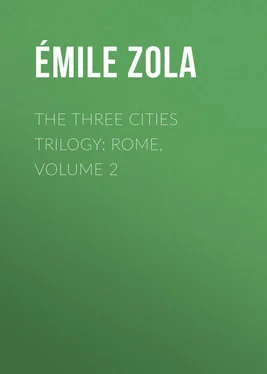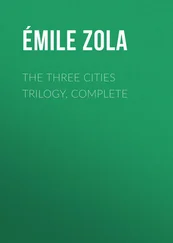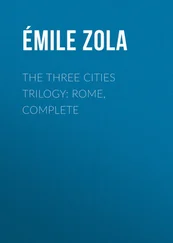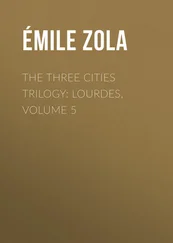Émile Zola - The Three Cities Trilogy - Rome, Volume 2
Здесь есть возможность читать онлайн «Émile Zola - The Three Cities Trilogy - Rome, Volume 2» — ознакомительный отрывок электронной книги совершенно бесплатно, а после прочтения отрывка купить полную версию. В некоторых случаях можно слушать аудио, скачать через торрент в формате fb2 и присутствует краткое содержание. Жанр: literature_19, foreign_antique, foreign_prose, на английском языке. Описание произведения, (предисловие) а так же отзывы посетителей доступны на портале библиотеки ЛибКат.
- Название:The Three Cities Trilogy: Rome, Volume 2
- Автор:
- Жанр:
- Год:неизвестен
- ISBN:нет данных
- Рейтинг книги:4 / 5. Голосов: 1
-
Избранное:Добавить в избранное
- Отзывы:
-
Ваша оценка:
- 80
- 1
- 2
- 3
- 4
- 5
The Three Cities Trilogy: Rome, Volume 2: краткое содержание, описание и аннотация
Предлагаем к чтению аннотацию, описание, краткое содержание или предисловие (зависит от того, что написал сам автор книги «The Three Cities Trilogy: Rome, Volume 2»). Если вы не нашли необходимую информацию о книге — напишите в комментариях, мы постараемся отыскать её.
The Three Cities Trilogy: Rome, Volume 2 — читать онлайн ознакомительный отрывок
Ниже представлен текст книги, разбитый по страницам. Система сохранения места последней прочитанной страницы, позволяет с удобством читать онлайн бесплатно книгу «The Three Cities Trilogy: Rome, Volume 2», без необходимости каждый раз заново искать на чём Вы остановились. Поставьте закладку, и сможете в любой момент перейти на страницу, на которой закончили чтение.
Интервал:
Закладка:
Émile Zola
The Three Cities Trilogy: Rome, Volume 2
PART II
IV
ON the afternoon of that same day Pierre, having leisure before him, at once thought of beginning his peregrinations through Rome by a visit on which he had set his heart. Almost immediately after the publication of "New Rome" he had been deeply moved and interested by a letter addressed to him from the Eternal City by old Count Orlando Prada, the hero of Italian independence and reunion, who, although unacquainted with him, had written spontaneously after a first hasty perusal of his book. And the letter had been a flaming protest, a cry of the patriotic faith still young in the heart of that aged man, who accused him of having forgotten Italy and claimed Rome, the new Rome, for the country which was at last free and united. Correspondence had ensued, and the priest, while clinging to his dream of Neo-Catholicism saving the world, had from afar grown attached to the man who wrote to him with such glowing love of country and freedom. He had eventually informed him of his journey, and promised to call upon him. But the hospitality which he had accepted at the Boccanera mansion now seemed to him somewhat of an impediment; for after Benedetta's kindly, almost affectionate, greeting, he felt that he could not, on the very first day and with out warning her, sally forth to visit the father of the man from whom she had fled and from whom she now asked the Church to part her for ever. Moreover, old Orlando was actually living with his son in a little palazzo which the latter had erected at the farther end of the Via Venti Settembre.
Before venturing on any step Pierre resolved to confide in the Contessina herself; and this seemed the easier as Viscount Philibert de la Choue had told him that the young woman still retained a filial feeling, mingled with admiration, for the old hero. And indeed, at the very first words which he uttered after lunch, Benedetta promptly retorted: "But go, Monsieur l'Abbe, go at once! Old Orlando, you know, is one of our national glories – you must not be surprised to hear me call him by his Christian name. All Italy does so, from pure affection and gratitude. For my part I grew up among people who hated him, who likened him to Satan. It was only later that I learned to know him, and then I loved him, for he is certainly the most just and gentle man in the world."
She had begun to smile, but timid tears were moistening her eyes at the recollection, no doubt, of the year of suffering she had spent in her husband's house, where her only peaceful hours had been those passed with the old man. And in a lower and somewhat tremulous voice she added: "As you are going to see him, tell him from me that I still love him, and, whatever happens, shall never forget his goodness."
So Pierre set out, and whilst he was driving in a cab towards the Via Venti Settembre, he recalled to mind the heroic story of old Orlando's life which had been told him in Paris. It was like an epic poem, full of faith, bravery, and the disinterestedness of another age.
Born of a noble house of Milan, Count Orlando Prada had learnt to hate the foreigner at such an early age that, when scarcely fifteen, he already formed part of a secret society, one of the ramifications of the antique Carbonarism. This hatred of Austrian domination had been transmitted from father to son through long years, from the olden days of revolt against servitude, when the conspirators met by stealth in abandoned huts, deep in the recesses of the forests; and it was rendered the keener by the eternal dream of Italy delivered, restored to herself, transformed once more into a great sovereign nation, the worthy daughter of those who had conquered and ruled the world. Ah! that land of whilom glory, that unhappy, dismembered, parcelled Italy, the prey of a crowd of petty tyrants, constantly invaded and appropriated by neighbouring nations – how superb and ardent was that dream to free her from such long opprobrium! To defeat the foreigner, drive out the despots, awaken the people from the base misery of slavery, to proclaim Italy free and Italy united – such was the passion which then inflamed the young with inextinguishable ardour, which made the youthful Orlando's heart leap with enthusiasm. He spent his early years consumed by holy indignation, proudly and impatiently longing for an opportunity to give his blood for his country, and to die for her if he could not deliver her.
Quivering under the yoke, wasting his time in sterile conspiracies, he was living in retirement in the old family residence at Milan, when, shortly after his marriage and his twenty-fifth birthday, tidings came to him of the flight of Pius IX and the Revolution of Rome. 1 1 It was on November 24, 1848, that the Pope fled to Gaeta, consequent upon the insurrection which had broken out nine days previously. – Trans.
And at once he quitted everything, wife and hearth, and hastened to Rome as if summoned thither by the call of destiny. This was the first time that he set out scouring the roads for the attainment of independence; and how frequently, yet again and again, was he to start upon fresh campaigns, never wearying, never disheartened! And now it was that he became acquainted with Mazzini, and for a moment was inflamed with enthusiasm for that mystical unitarian Republican. He himself indulged in an ardent dream of a Universal Republic, adopted the Mazzinian device, "/Dio e popolo/" (God and the people), and followed the procession which wended its way with great pomp through insurrectionary Rome. The time was one of vast hopes, one when people already felt a need of renovated religion, and looked to the coming of a humanitarian Christ who would redeem the world yet once again. But before long a man, a captain of the ancient days, Giuseppe Garibaldi, whose epic glory was dawning, made Orlando entirely his own, transformed him into a soldier whose sole cause was freedom and union. Orlando loved Garibaldi as though the latter were a demi-god, fought beside him in defence of Republican Rome, took part in the victory of Rieti over the Neapolitans, and followed the stubborn patriot in his retreat when he sought to succour Venice, compelled as he was to relinquish the Eternal City to the French army of General Oudinot, who came thither to reinstate Pius IX. And what an extraordinary and madly heroic adventure was that of Garibaldi and Venice! Venice, which Manin, another great patriot, a martyr, had again transformed into a republican city, and which for long months had been resisting the Austrians! And Garibaldi starts with a handful of men to deliver the city, charters thirteen fishing barks, loses eight in a naval engagement, is compelled to return to the Roman shores, and there in all wretchedness is bereft of his wife, Anita, whose eyes he closes before returning to America, where, once before, he had awaited the hour of insurrection. Ah! that land of Italy, which in those days rumbled from end to end with the internal fire of patriotism, where men of faith and courage arose in every city, where riots and insurrections burst forth on all sides like eruptions – it continued, in spite of every check, its invincible march to freedom!
Orlando returned to his young wife at Milan, and for two years lived there, almost in concealment, devoured by impatience for the glorious morrow which was so long in coming. Amidst his fever a gleam of happiness softened his heart; a son, Luigi, was born to him, but the birth killed the mother, and joy was turned into mourning. Then, unable to remain any longer at Milan, where he was spied upon, tracked by the police, suffering also too grievously from the foreign occupation, Orlando decided to realise the little fortune remaining to him, and to withdraw to Turin, where an aunt of his wife took charge of the child.
Читать дальшеИнтервал:
Закладка:
Похожие книги на «The Three Cities Trilogy: Rome, Volume 2»
Представляем Вашему вниманию похожие книги на «The Three Cities Trilogy: Rome, Volume 2» списком для выбора. Мы отобрали схожую по названию и смыслу литературу в надежде предоставить читателям больше вариантов отыскать новые, интересные, ещё непрочитанные произведения.
Обсуждение, отзывы о книге «The Three Cities Trilogy: Rome, Volume 2» и просто собственные мнения читателей. Оставьте ваши комментарии, напишите, что Вы думаете о произведении, его смысле или главных героях. Укажите что конкретно понравилось, а что нет, и почему Вы так считаете.












